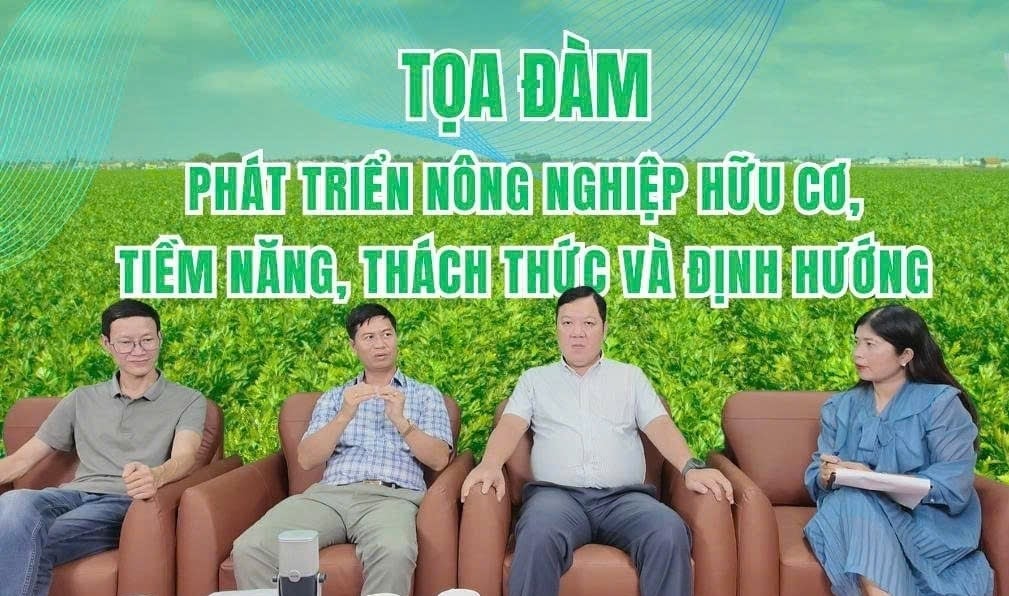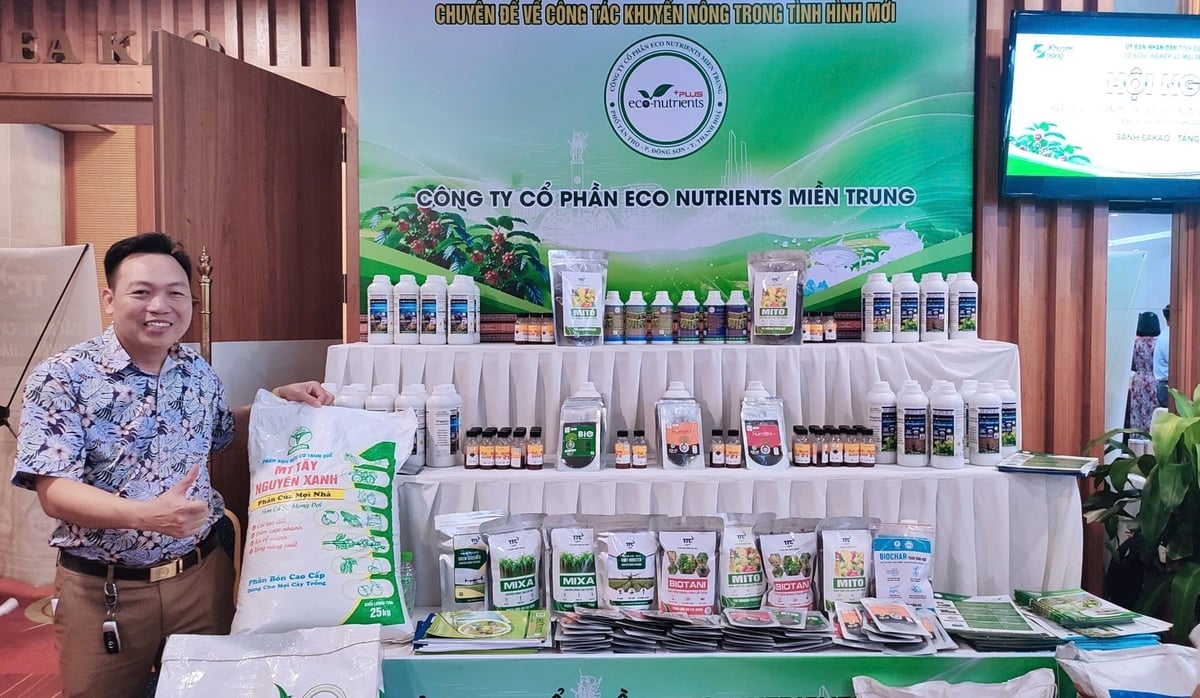October 30, 2025 | 12:22 GMT +7
October 30, 2025 | 12:22 GMT +7
Hotline: 0913.378.918
October 30, 2025 | 12:22 GMT +7
Hotline: 0913.378.918
Recently, the Western Highlands Agriculture and Forestry Science Institute (WASI) organized a seminar titled “Vietnam’s organic agriculture market analysis: Potentials, challenges, directions..”
Participants included Mr. Phan Viet Ha, Acting Deputy Director of the WASI; Mr. Bui Khanh Tung, organic agriculture expert from the Vietnam Organic Agriculture Association; and Mr. Le Van Vuong, Director of Vuong Thanh Cong Co., Ltd.
At the seminar, speakers shared key factors driving the development of organic agriculture in Vietnam and affirmed that it is an inevitable trend, aligned with the demand for green, safe, and sustainable consumption.
Mr. Phan Viet Ha noted that Vietnam has major advantages in climate and soil conditions for agricultural development and is receiving strong government support through various policies. However, he emphasized that barriers related to standards, certification, and quality control remain significant challenges.

Participants attending the seminar. Photo: Tran Tho.
From a market perspective, Mr. Bui Khanh Tung noted that products such as organic vegetables, rice, coffee, and tea are in high demand both domestically and for export. However, the biggest challenges remain high production costs and consumer trust.
Mr. Le Van Vuong, Director of Vuong Thanh Cong Co., Ltd. - a pioneer in the production, processing, and supply of organic coffee - shared that the company’s transition to organic farming began in 2017, requiring significant investments of time, finance, and technical expertise. In the early stages, the company faced difficulties with yield, farming techniques, and the costs of organic certification, but at the same time, this opened opportunities to access premium markets and build a reputable brand.
According to Mr. Vuong, the company has leveraged major opportunities: growing domestic demand for safe products; stringent export markets such as Europe, Japan, and the U.S.; and favorable policies and FTAs such as EVFTA and CPTPP that facilitate agricultural exports. Currently, Vuong Thanh Cong Co., Ltd. has established a closed value chain from certified organic raw material areas to processing and direct distribution. Its products are available not only in reputable domestic retail channels but also in international markets. The greatest achievement has been building a trusted brand among consumers, alongside stable business results.
Vietnam’s organic agricultural market is at a critical turning point, with vast growth potential but also many challenges.
The market has made remarkable progress in terms of potential. Organic agricultural exports now exceed USD 335 million per year, an increase of more than 418% compared to the 2010-2016 period. Certified organic farming areas have expanded to 75,020 hectares, with an additional 260,725 hectares in transition (as of 2023).
The main drivers are surging domestic demand, with 72-80% of Vietnamese consumers willing to pay more for green and safe products. Export opportunities are also growing, supported by free trade agreements (FTAs) and booming global demand, projected to reach USD 546 billion by 2032.
However, the path forward remains fraught with challenges. First, production and technical barriers include high labor and certification costs, along with difficulties in pest management. Second, supply chains are vulnerable to climate change and lack specialized storage standards. Third, and most critically, consumer trust remains a major issue, as the prevalence of counterfeit, mislabeled, and "fake organic" products on e-commerce platforms erodes confidence and undermines the intangible value of genuine products.
Experts emphasized the enormous potential of Vietnam’s organic agricultural market, both domestically and for exports particularly for key products such as vegetables, rice, coffee, and tea. However, organic production still faces obstacles including high costs, complex certification processes, and inconsistent consumer trust.

Organic vermicompost fertilizer products from MT Tay Nguyen Xanh Company are trusted by farmers. Photo: Tran Tho.
In discussing strategic directions, the speakers agreed that Vietnam needs to develop the domestic market and expand exports simultaneously. At the same time, the government should finalize the legal framework, support certification processes, and promote communication to raise consumer awareness.
The development of organic agriculture in Vietnam is not only a trend but also a strategic step to enhance the value of traditional agricultural products. Currently, 13 major product groups have been certified organic, including rice, vegetables, fruits, tea, coffee, cashew nuts, pork, dairy cattle, chicken, shrimp, star anise, and cinnamon. Notably, these are all key agricultural export commodities of Vietnam for many years, contributing significantly to the total export value of agriculture, forestry, and fisheries.
The fact that traditional agricultural products are being developed organically shows a strategic shift from mass production to a focus on added value and quality. Instead of competing solely on price, Vietnamese agricultural products are seeking an advantage by meeting the strict requirements of premium markets and health-conscious consumers. By adopting organic standards, Vietnam is not only tapping into niche markets but also building a sustainable competitive edge in terms of quality and safety in the global market.
At the conclusion of the seminar, the experts conveyed a common message: For Vietnam’s organic agriculture to develop sustainably, close collaboration among the government, businesses, and farmers is essential, along with building transparent and reliable value chains to gradually bring Vietnamese organic products to the global market.
Translated by Kieu Chi

(VAN) A comprehensive MRV process for high-quality rice cultivation has been finalized and is now ready to accurately measure and assess emission reductions.

(VAN) Hundreds of thousands of hectares of aging, low-yield coffee in the Central Highlands have been 'rejuvenated' through the replanting program, delivering significantly higher productivity than before.
/2025/10/29/2359-1-171705_4.jpg)
(VAN) Wood plastic composite made from recycled plastic combined with wood and stone powder is being piloted, with the expectation of collecting and recycling a large volume of plastic waste each year.

(VAN) The FAO-funded project aims to control banana wilt disease nationwide, with five key outcomes targeted toward sustainable banana production.

(VAN) The Integrated Plant Health Management (IPHM) helps farmers in Quang Ngai increase rice production efficiently and sustainably.

(VAN) Developing low-emission cultivation technology packages, MRV system, strengthening multi-stakeholder cooperation are to realize the goal of low-emission crop production.
/2025/10/23/5928-2-194850_964.jpg)
(VAN) The 'Regenerative cocoa production to support livelihood development in Vietnam' (ReCoPro) project marks an important step toward sustainable cocoa production.